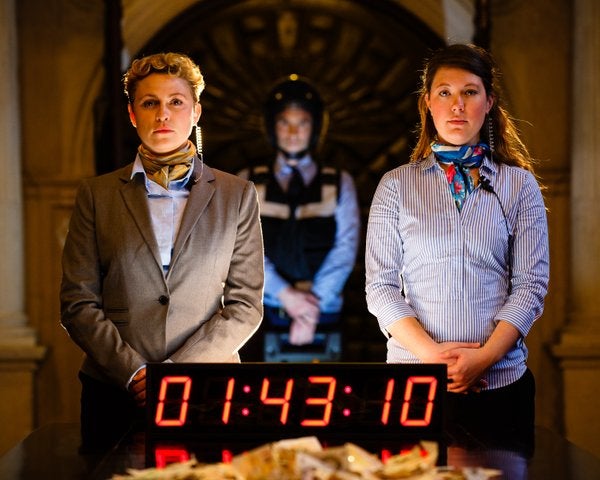
Cheryl Chapman on the new interactive play that teaches us about how and why we give
Discussing money in public and with strangers makes us Brits distinctly uncomfortable, but this national taboo is now the star of a fascinating piece of ‘game theatre’ entitled The Money.
The premise of The Money is simple: a group of ‘benefactors’ gather round a table and must unanimously decide in 90 minutes how to spend a pot of money they have donated, watched on by a group of ticket-paying ‘silent witnesses’.
As one of those witnesses, I was riveted, appalled, bemused, frustrated and heartened by the twists and turns the conversation took and the bonkers and beautiful ideas generated as the largely homogenous group of enlightened, well-educated mostly young adults bonded over the best way to spend ’167.
Should it buy a dog they could share, an extravagant wreath for the first among them to die or seeds to grow a community? Should it be gambled, invested or frittered on drinks at the bar for them all? Should it be given to charity as a lump sum or in small amounts, donated to the Nepal relief effort, or hidden in library books as random acts of kindness for lucky readers to find?
Each idea unleashed a raft of issues that mirror those that real-life philanthropists wrestle with as they aim to achieve the greatest impact from their limited donated resources.
This is why I brought The Money to Guildhall last month as part of the launch of our new research ‘More to Give: Millennials Networking for a Better World’ that captures an emerging trend among young professionals to get together to donate money and skills.
Our report highlights an opportunity to increase London’s future annual giving by ’20 million a year through donor-led networks such as BeyondMe, City Funding Network and BeMore that are growing in popularity. There are currently around 80 giving networks across the UK and Ireland, and the report surveyed in depth more than 100 millennial members of networks located in, or connected with, London.
The survey shows that two-fifths of network members want to increase the amount they give to charities and do more volunteering. Key motivations are improving their local community and creating an impact with their donation.
The Money brilliantly mirrors the kinds of difficult and bonding conversations these young people are having with their peers as they aim to achieve the greatest impact. At the Guildhall launch event, those taking part in The Money were not Joe Public as normal, but invited sector specialists – academics, advisers, CSR professionals and network givers – who are well-versed in the complexities of giving money effectively.
So the conversation about how their communal ’150 should be spent immediately turned to leverage, sustainability and impact. After deciding on mental health as a cause the group was persuaded by one member’s personal experience that the charity CALM – Campaign against Living Miserably that battles the issue of suicide among young males – would be a good beneficiary.
Silent witnesses can join the conversation at any time by donating ’10 to the pot, duly ringing a bell and taking their place at the table. Seven silent witnesses succumbed to the pull of the conversation at the launch event and by the end nineteen benefactors had donated together more than ’200.
And as our research shows, some wanted to donate more than money – one offered a venue to hold a fundraising event for CALM and another donated a day’s publicity skills to help get people along to it. Our survey reveals over four-fifths of network members in London want to use their skills and professional experience to make a difference. In The Money we see art imitating life.
The artistic director of Exeter-based Kaleider Theatre, Seth Honnor, who created The Money, explains his reasons for doing so: ‘It’s about how we decide on limited resources – possibly /the/ challenge for humanity at a time of enormous population growth within a finite earth system.
‘Money is just a counting system for ownership – and ownership is a very odd concept that we are totally enthralled to – in that it eclipses our ability to think outside it. But I think the idea we “own” bits of our planetary system is hugely problematic in a societal context because it means, basically, that someone else doesn’t own it. And what use is that?’
The growing trend for giving networks indicates that a new generation is not shying away from that challenge and are keen to put their mouths where their money is to find a solution.
The next performances of The Money are 16 February 2016 in Cambridge Guildhall presented by Cambridge Junction; 14 April 2016 in Deptford Town Hall, presented by The Albany. Check kaleider.com/projects/the-money for more details.
Download More to Give: Millennials Networking for a Better World.
Cheryl Chapman is director of City Philanthropy whose latest report can be downloaded here






